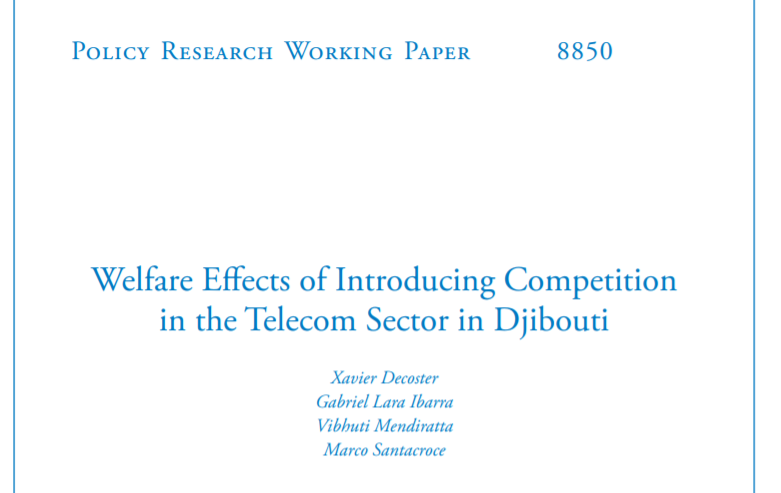

ABSTRACT
Djibouti is very well placed, as a landing site of undersea fiber optic cables, to benefit from the digital economy. However, the prevalence of a single national telecom operator in the country has stifled service delivery and innovation in the telecom sector.
Mobile broadband coverage and access to the internet in Djibouti in 2018 remains below that of many Sub-Saharan African countries. This paper simulates the impact of the introduction of competition on the telecom sector’s prices and its implications for households’ welfare.
The analysis finds important gains in welfare among current users of telecom services, with the largest gains going to the richest households. On the extensive margin, the analysis also finds a higher likelihood of taking up of telecom services across the consumption distribution but skewed toward the rich. More work is needed to understand the implications of changes in the telecom sector, especially as greater access may lead to more unequal access, at least in the short term.

This paper is a product of the Poverty and Equity Global Practice and the Digital Development Global Practice. It is part of a larger effort by the World Bank to provide open access to its research and make a contribution to development policy discussions around the world.
Policy Research Working Papers are also posted on the Web at http://www.worldbank.org/ prwp.
The authors may be contacted at glaraibarra@worldbank.org.
more recommended stories
 Kenya’s Unjustifiable Interference in Sudan: A Grave Violation of International Law and Regional Stability
Kenya’s Unjustifiable Interference in Sudan: A Grave Violation of International Law and Regional StabilityBy: Abdi Jama Kenya’s continued meddling.
 The Dire Need for Reunification of the Somaliland People: Addressing theDivisive Impact of the Kulmiye Government
The Dire Need for Reunification of the Somaliland People: Addressing theDivisive Impact of the Kulmiye GovernmentAbstractThe unity and solidarity of Somaliland.
-
Navigating the Impact of Social Media on Youth: Well-being, Academic Performance, and National Development
IntroductionIn today’s digital age, the role.
 Might makes right” : how Ethiopia’s landlockedness is hinderingregional integration
Might makes right” : how Ethiopia’s landlockedness is hinderingregional integrationBy Maal Sareeye The world order.

